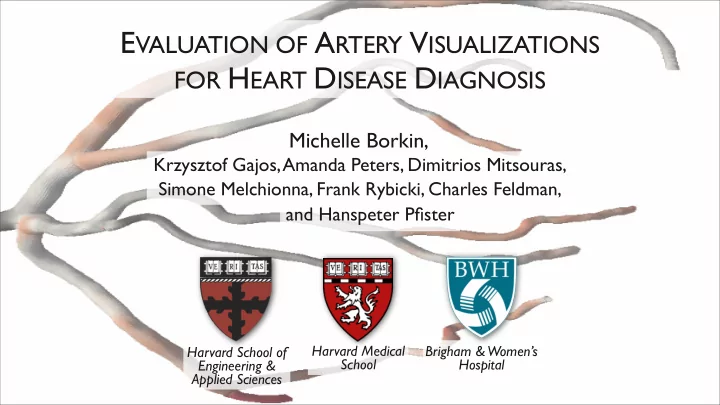

E VALUATION OF A RTERY V ISUALIZATIONS FOR H EART D ISEASE D IAGNOSIS Michelle Borkin, Krzysztof Gajos, Amanda Peters, Dimitrios Mitsouras, Simone Melchionna, Frank Rybicki, Charles Feldman, and Hanspeter Pfister Harvard Medical Brigham & Women’s Harvard School of School Hospital Engineering & Applied Sciences
N ON -I NVASIVE D IAGNOSIS Generate patient geometries Obtain patient CT data Segment arteries Patient specific Visualize and Clinical decision blood flow simulation analyze data
D ATA This can rupture and give you a heart attack! plaque very low ESS low ESS initial disease ESS = endothelial shear stress (i.e., frictional force from blood flow)
D ATA This can rupture and give you a heart attack! Low ESS = BAD plaque very low ESS low ESS cannot directly measure ESS in living patients! initial disease ESS = endothelial shear stress (i.e., frictional force from blood flow)
P REVIOUS W ORK • ESS Vessel Visualization [e.g., Forsberg, et al. (2000), Kanitsar, et al. (2002), Museth, et al. (2008), Ropinski, et al. (2009)] [Rybicki, et al. 2009] [Chatzizisis, et al. 2007]
P REVIOUS W ORK • 2D vs. 3D Evaluation [e.g., Cockburn & McKenzie (2002), Laidlaw, et al. (2005), Tory, et al. (2007), Forsberg et al. (2009)] [Troy, et al. 2007] [Laidlaw, et al. 2005] [Forsberg, et al. 2009]
F ORMATIVE Q UALITATIVE S TUDY • Semi-structured interviews • 10 medical doctors and researchers • Brigham & Women’s Hospital (Boston, MA) Visualize and Clinical decision analyze data
3D
L AYOUT AND P ROJECTIONS
C OLOR
C OLOR Preferred Too “radiological” (standard) Non-rainbow favorite!
C OLOR
Q UANTITATIVE S TUDY : G OALS 3D vs. 2D rainbow vs. diverging
Q UANTITATIVE S TUDY • 21 Harvard Medical students (12 women and 9 men) • Mixed within-subject and between-subject design: � within = dimensionality of representation (2D or 3D) � between = color mapping (rainbow or diverging) e.g., Participant A e.g., Participant B
Q UANTITATIVE S TUDY • Dependent measures: � fraction of low ESS regions identified � number of false positives (i.e., non-low ESS regions identified as low ESS) � time to complete a diagnosis
Q UANTITATIVE S TUDY
Q UANTITATIVE S TUDY
Q UANTITATIVE S TUDY
Q UANTITATIVE S TUDY
R ESULTS
A CCURACY Strong effect of dimensionality on accuracy 39% 62% How many low ESS regions found?
A CCURACY Strong effect of dimensionality on accuracy ...as well as color 39% 91% How many low ESS regions found?
E FFICIENCY Participants more efficient in 2D . 5.6 sec/region 2.4 sec/region
E FFICIENCY Participants more efficient in 2D . Rainbow color map has greater effect on efficiency in 3D. 10.2 sec/region 2.6 sec/region
C OMPLEXITY Accuracy decreases with increased data complexity in 3D participants less accurate
C OMPLEXITY Accuracy decreases with increased data complexity in 3D (not true in 2D!)
S UBJECTIVE R ESPONSES 2D 3D � I found it easy to identify � low ESS regions. � I was able to perform the � task efficiently. I am confident I found all the � � low ESS regions. - - I am confident all the places I marked are really low ESS.
F INDINGS S UMMARY • Domain experts important for design and evaluation • Even for 3D spatial data, a 2D representation is � more accurate for spatial tasks � more efficient for spatial tasks • Rainbow color map � � is not accurate and not efficient � has adverse effects even greater in 3D
C ONCLUDING R EMARKS • 3D representation is still essential for surgical planning • 2D tree diagram applicable to other applications • Quantitative study convinced our users of good visualization practices
Recommend
More recommend